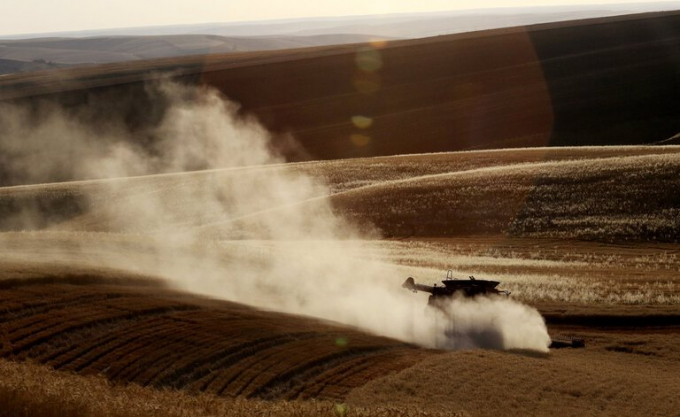June 16, 2025 | 05:48 GMT +7
June 16, 2025 | 05:48 GMT +7
Hotline: 0913.378.918
June 16, 2025 | 05:48 GMT +7
Hotline: 0913.378.918

Wheat harvest in Eastern Washington. Observers predict this year’s weather will result in a poor harvest. (File photo, 2016. Photo: The Seattle Times
But after weeks of extreme drought and heat, Green now walks out to see her wheat fields short, sparse and bluer than years past. Every indication, she said, points to wheat kernels that are tiny, dry and shriveled up little things.
“This is probably going to be the worst harvest we’ve had for the 35 years we’ve been doing this,” Green said.
Experts hold little to no optimism about this year’s wheat harvest after droughts during the spring and summer, and then the record heat wave, shriveled fields in the Inland Northwest.
Glen Squires, CEO of the Washington Grain Commission, said he’s expecting winter wheat to be about 50 bushels per acre for Eastern Washington when the average tends to be about 70 bushels per acre.
Harvesting has not started in the region, but some results have come in from farms in drier South Central Washington that start the process earlier.
They’re not good.
“We have had complete crop failures in Benton and Yakima counties,” said Michelle Hennings, executive director of the Washington Association of Wheat Growers.
Hennings said local yields in Eastern Washington likely won’t be as disastrous, and they will vary from farm to farm depending on if they have received small pockets of rain here and there.
But the overall reality is that wheat production will likely be down across the board in the Inland Northwest.
Farmers can take some solace in the high price of wheat, which has skyrocketed as wheat fields across the state and the U.S. face drought conditions.
But the problems for Washington farmers might not just be the amount of wheat they produce, but the quality of it as well.
Eastern Washington is known around the world as the home of soft white wheat with low protein count, which makes the grain great for using in cookies, crackers and cakes.
It’s why countries from around the world, from Japan to Yemen, choose to import Washington wheat, resulting in the state’s $663 million worth of exports in 2020.
But Squires said the recent heat stress could raise protein levels, which could cause buyers to seek price discounts.
Adding to the problems, said Mike Carstensen, a farmer from Lincoln County, is that impacts from the COVID-19 pandemic significantly raised the costs of vital equipment and fertilizer.
With a higher cost of production, many farmers can’t afford smaller yields.
Squires cautioned that the double whammy of higher protein levels and lower yields won’t be for certain until harvests in Eastern Washington actually get under way in late July and early August.
Crop insurance could be critical for farmers this year.
“This is why we advocate very heavily for crop insurance,” said Hennings. “This is the year you’re probably going to need it.”
Crop insurance protects growers against potential disastrous events like a fall in prices or, in this case, weather conditions that significantly impact yields. Most farmers in Eastern Washington have insurance.
The safety net was very important for Washington farmers in the 2014-2015 growing season when a similar devastating drought and heat wave struck the area.
But Green, the farmer from Fairfield, said the current crop year doesn’t really compare to any other.
“It’s worse than 2015,” Green said. “Almost every Pacific Northwest farm is in some kind of trouble.”
(The Seattle Times)

(VAN) Extensive licensing requirements raise concerns about intellectual property theft.

(VAN) As of Friday, a salmonella outbreak linked to a California egg producer had sickened at least 79 people. Of the infected people, 21 hospitalizations were reported, U.S. health officials said.

(VAN) With the war ongoing, many Ukrainian farmers and rural farming families face limited access to their land due to mines and lack the financial resources to purchase needed agricultural inputs.

(VAN) Vikas Rambal has quietly built a $5 billion business empire in manufacturing, property and solar, and catapulted onto the Rich List.

(VAN) Available cropland now at less than five percent, according to latest geospatial assessment from FAO and UNOSAT.

(VAN) Alt Carbon has raised $12 million in a seed round as it plans to scale its carbon dioxide removal work in the South Asian nation.

(VAN) Attempts to bring down the price of the Japanese staple have had little effect amid a cost-of-living crisis.